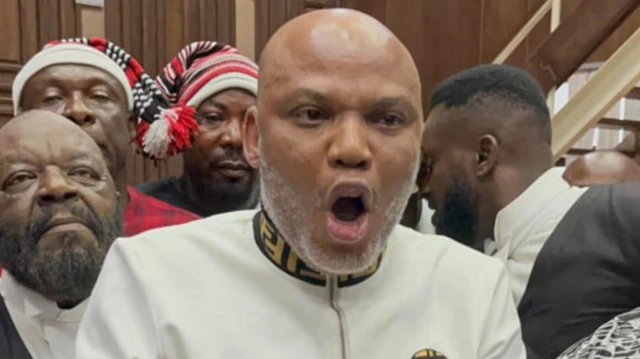Now Reading: VeryDarkMan alleges deal sees Nnamdi Kanu released only in old age
-
01
VeryDarkMan alleges deal sees Nnamdi Kanu released only in old age
VeryDarkMan alleges deal sees Nnamdi Kanu released only in old age

Nigerian activist and social critic, VeryDarkMan, has sparked widespread controversy after claiming that IPOB leader, Nnamdi Kanu, will not be released until he becomes old and frail alleging that such is part of a “secret deal” involving powerful political figures.

Nigeria’s controversial independence campaigner, Nnamdi Kanu leader of the proscribed Indigenous People of Biafra (IPOB) remains in detention, facing terrorism and treason charges. Amid the high-profile case, social media activist VeryDarkMan has presented a startling assertion: that Kanu’s release is already tied to a deal which will only see him freed when he is old and frail.
According to a post attributed to VeryDarkMan,
“Nnamdi Kanu will likely be released at his old age, that’s the government’s plan. All these court appearances are just for public sake.”
The remark has stirred fresh outrage and debate across the south-east and among IPOB supporters, who view the detention as politically motivated rather than purely legal.
VeryDarkMan’s claim centres on three main points
READ ALSO: EFCC Insists Probe Into Okowa’s ₦1.3 Trillion Derivation Fund Diversion Still Ongoing
-
Delay tactics through legal process: He asserts that repeated court adjournments and postponements are part of a strategy to extend detention indefinitely. “The court will keep adjourning the case,” he said. Instagram
-
A bipartisan agreement: He suggests that powerful interests both governmental and regional are part of the arrangement ensuring Kanu remains confined until old age.
-
Public theatre vs private outcome: According to the claim, visible hearings and legal manoeuvres serve as theatre for domestic and international optics, while the core deal proceeds quietly.

If accurate, the allegation casts Kanu’s extended trial and detention in an even more political light beyond the courtroom, reaching into the realm of state strategy and regional balance.
Kanu was first arrested in 2015 and was re-arrested in 2021 after fleeing bail in 2017, According to Arise News As of October 2025, his trial has been adjourned due to issues like missing case files, legal representation changes and objections over jurisdiction. The High Court in Abuja recently postponed proceedings to enable Kanu prepare his defence.
Separately, a Reuters dispatch noted the broader backdrop
“Nigerian police used teargas to quash protests over separatist leader Nnamdi Kanu’s detention…”
The verdict of the allegation by VeryDarkMan thus enters a fraught environment of ethnic tension, legal complexity and high-stakes politics.
VeryDarkMan Response and implications
At this time, neither the government nor Kanu’s camp has officially confirmed or refuted VeryDarkMan’s specific claim of a “release-at-old-age” deal. However, the assertion has resonated strongly with those who view Kanu’s detention as unjust and indefinitely prolonged.
If the claim holds any validity, it raises pressing questions:
-
What role do political bargains play in legal cases of this nature?
-
Does the legal system risk being used to enact outcomes beyond courtroom merits?
-
How does this affect public trust in justice for high-profile defendants?
As VeryDarkMan bluntly puts it
“This is not about him going free tomorrow it’s about waiting until he cannot fight anymore.”
Whether his assertion is accurate or not, it underscores the perception among many that Kanu’s case is not merely judicial but deeply embedded in Nigeria’s power dynamics and regional posture. For now, the waiting game continues and with it, the question of when (or whether) Nnamdi Kanu will walk free.






